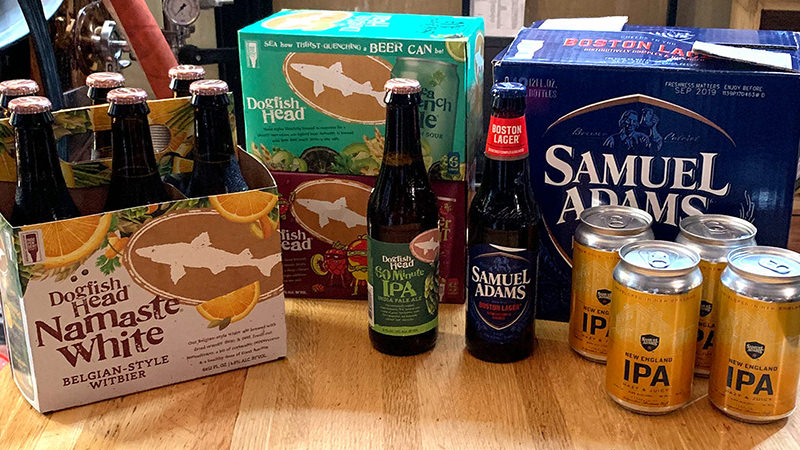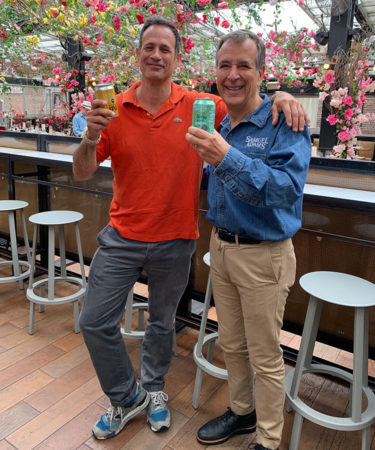On Friday morning, Boston Beer founder and chairman Jim Koch and Dogfish Head Craft Brewery co-founder Sam Calagione visited New York City’s Eataly rooftop to speak to members of the media about the merger announced Thursday.
“Here’s an example of how two American indie craft breweries could collaborate, find a way to grow, and yet do it still within the indie craft community,” Calagione said, leaning on a bag of pilsner malt in the Birreria brewhouse.
“That was important to both Sam and I, [that] both of us remain independent American craft brewers,” Koch added. “That’s what we fought for for decades. Now … we can set an example for other companies buying or merging with other brewers, and being transparent to the consumer who makes the beer.”
Both brewery leaders sipped on one another’s beers; Koch, a Dogfish Head 60 Minute IPA; Calagione, a Samuel Adams ‘76. (And later, as pictured above, a SeaQuench and a New England IPA, respectively.)
Per current estimates, the combined brands are on pace to sell close to 5 million barrels of product this year. As such, the entity maintains its status as a craft brewery, per the definition created by the Brewers Association, which Koch and Calagione helped establish.
The deal is valued at $300 million. Dogfish Head will operate under Boston Beer, shifting Calagione and his wife and co-founder Mariah out of their roles as controllers of the brand, he said. Calagione will join Boston Beer’s board of directors next year.
Boston Beer’s 1,400 employees and Dogfish Head’s 400 will merge into one entity. Both company logos will emblazon product labels. Production will remain relatively unchanged, Koch and Calagione say.
Calagione compared the merger to an “Amish quilt,” sewing together each brand’s strengths; Dogfish Head’s ales and distilled spirits, Boston Beer’s lagers, ciders, and hard seltzers. “It felt very natural,” he said.

The only change consumers will see, they say, will be accessibility. “We’re hoping our beers are now going to be easier for you to find,” Calagione said.
Personally, I don’t think Dogfish Head’s beers are hard to find. After all, they’re currently distributed in more than 40 states. But Boston Beer’s backing will propel Dogfish Head from being the country’s 13th largest craft brewery to part of the second largest.
Boston Beer benefits, too: Dogfish Head currently produces the most successful sour beer brand in the U.S., SeaQuench Ale, and its distillery brand saw sales grow 89 percent last year.
Koch cites Dogfish Head’s co-founders, Sam and Mariah Calagione, as its greatest resource. “I wouldn’t have done it if it was just buying the [Dogfish Head] assets,” Koch said. “That had no interest to me. The fact that Sam and Mariah wanted to join forces and do things together that we couldn’t do separately – that was the key reason for this transaction,” he said.
“That’s why this merger was not a difficult decision for us,” Calagione added. As the second-largest shareholders of the company (Koch and his family hold the most stock), it’s “a massive leap of faith that we’re making,” Calagione said, but “the leap felt exhilarating and not scary.”
Still, for the beer community, this is both literally figuratively a very big deal. As I said in the VinePair HQ on Thursday evening, and to Calagione and Koch Friday morning, it’s like the opposite of your parents getting divorced: A coming together rather than a split, but no less disorienting in the moment. Do they still love me?
Or, as a longtime fan might wonder, Will the beer I love stay the same?
According to Koch, “no beers will be harmed.” I believe that — I don’t see a benefit to Boston Beer turning Dogfish Head into Samuel Adams. I am, however, interested to see how big this quilt can grow.
Will the patchwork merger mirror Canarchy’s, sewing itself into each U.S. region? Will the Brewers Association change the craft beer definition again to accommodate its growth? Will anyone (read: beer Twitter) be scrutinizing business decisions like these in five years, or could this become commonplace among mid- and large-sized craft breweries looking for survival strategies in an exceedingly competitive market?
“For 35 years I have had a fool-proof succession plan,” Koch said. “‘Jim, don’t die.’”
If anyone has the serum for craft beer survival, I suppose it’s him.
